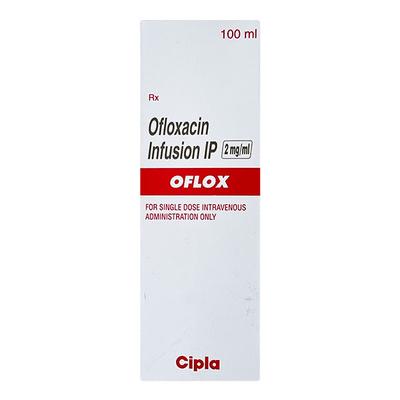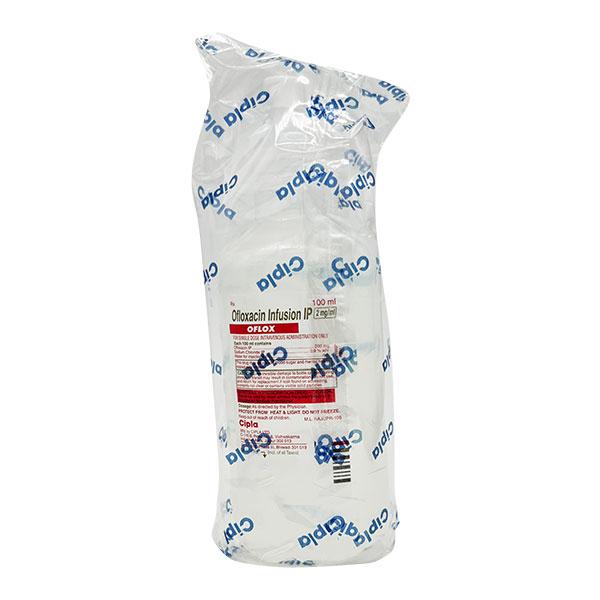

Netmeds First Membership
Quick Links
Introduction About OFLOX INFUSION
OFLOX INFUSION contains Ofloxacin, which belongs to the group of medicines called Antibiotics. It is recommended only for adults and is used to manage various bacterial infections involving the kidneys, genital tract, lungs, skin and soft tissue (the tissue under the skin and muscles). Bacterial infections are generally characterized by fever, extreme tiredness, swollen lymph nodes in the neck, armpits, groin or elsewhere, headache, nausea or vomiting.
Avoid drinking alcohol while receiving OFLOX INFUSION, as it may make you feel dizzy or sleepy. OFLOX INFUSION is not recommended for use if you have fits or ever have swollen tendons. Before receiving OFLOX INFUSION, inform your doctor if you have liver, kidney, heart, nerve, mental health problems, porphyria, myasthenia gravis if you are about to have any surgery or taking a medicine used in cancer (methotrexate).
OFLOX INFUSION is not recommended for use in pregnancy, breastfeeding women, children or adolescents, so consult your doctor before receiving it. The most common side effects of receiving OFLOX INFUSION are pain, redness or swelling at the area of administration. Contact your doctor if any of your symptoms get worse or persist.
Uses Of OFLOX INFUSION
It is indicated in the management of bacterial infections in adults, such as:
- urinary tract (kidney) infections
- genital tract infections (men and women)
- lung or chest infections
- skin and soft tissue infections
How OFLOX INFUSION Works
OFLOX INFUSION works by binding to and inhibiting bacterial enzymes required in DNA synthesis, thus interrupting DNA replication and managing bacterial cell multiplication.
How to use OFLOX INFUSION
OFLOX INFUSION will be given to you only by a doctor or a nurse into a vein as an intravenous infusion. Your doctor will decide the correct dose and duration for you depending upon your age, body weight and disease condition.
Side Effects Of OFLOX INFUSION
Common
- pain, redness or swelling at the area of administration
Uncommon
- nausea, vomiting, diarrhoea, stomach pain
- cough, common cold
- headaches, sleeping problems, dizziness or restlessness
- eye irritation
- fungal infection
Rare
- confusion or anxiety, nightmares, drowsiness, trouble walking due to poor muscle control
- change or loss of taste or smelling sense
- changes in levels of kidney enzymes
- feeling generally unwell
- swelling under the skin
- memory impairment
- seeing or hearing things that are not there, changed opinions and thoughts
Stop receiving OFLOX INFUSION and contact your doctor immediately if you experience any of the following side effects:
- allergic reaction (rash, trouble swallowing or breathing, swelling of your lips, face, throat or tongue)
- an uneven or fast heartbeat, low blood pressure (maybe during OFLOX INFUSION administration)
- watery diarrhoea, probably with blood in it, with stomach cramps and fever
- liver problems (loss of appetite, yellow eyes or skin)
- severe skin rashes (Stevens-Johnson Syndrome, Toxic Epidermal Necrolysis) with blistering or peeling of the skin around the lips, eyes, mouth, nose and genitals, flu-like symptoms, painful red or purplish rash that spreads)
- skin rashes after sun exposure
- low blood sugar levels (weakness or irritation, sweating, shaking)
- raised blood sugar levels (thirst, urinating more often than usual)
- swelling or discomfort in your tendons like in the Achilles tendon
- severe kidney inflammation (rash, fever, general pains)
- severe mental illness with suicidal ideation
- touch sensitivity
- problems with your coordination (spasms, irregular jerky movements, fidgeting, wriggling or body swaying)
- low white blood cell count (fever with chills, sweating, sore throat)
- low blood pressure (dizziness, lightheadedness)
- myasthenia gravis (muscle weakness)
- severe breathlessness
- drug rash (redness, bumps, blisters, hives, itching and sometimes peeling or pain)
- exfoliative dermatitis (skin redness with extensive scaling)
- muscle tissue breakdown
- tear or rupture of the ligaments
- uveitis (inflammation of the eye)
- bone marrow failure (unusual bleeding and bruising in the gums, nose or the skin)
- sudden, severe pain in your abdomen, chest or back
- tendon, muscle and joint pain of the upper and lower limbs, trouble walking
- abnormal sensations like tingling, tickling, numbness or burning
- sensory disorders like impairment of vision, taste, smell and hearing
- depression, memory impairment
- severe fatigue
- severe sleep disorders
- fits
How To Manage Side Effects
Nausea:
Take OFLOX INFUSION with or just after meals. Stick to simple meals. Avoid eating oily or spicy foods. If your symptom gets worse or persist, consult your doctor immediately.
Vomiting:
Get adequate rest. Drink lots of fluids, especially water. Have small sips if you feel sick. Eat when you feel like it – you do not need to eat or avoid any specific foods. Do not take medicines on your own to manage vomiting without consulting your doctor. If your symptom gets worse or persist, consult your doctor immediately.
Headache:
Drink an ample amount of water. Get adequate rest. Try to be relaxed and stress-free. Do not take medicines on your own to manage a headache without consulting your doctor. If your symptom gets worse or persist, consult your doctor immediately.
Dizziness:
Lie down until the dizziness subsides, then get up slowly. Move slowly and carefully, do not hurry. Get adequate rest. Drink plenty of water and other fluids. Avoid coffee, cigarettes, alcohol and drugs. If your symptom gets worse or persist, consult your doctor immediately.
Diarrhoea:
Drink lots of fluids, like water or fruit juice to keep yourself hydrated. Do not take medicines on your own to manage diarrhoea without consulting your doctor. If your symptom gets worse or persist, consult your doctor immediately.
Warning & Precautions
Pregnancy
OFLOX INFUSION is not recommended for use in pregnant women. Consult your doctor before receiving it.
Breastfeeding
OFLOX INFUSION is not recommended for use in breastfeeding women. Consult your doctor before receiving it.
Driving and Using Machines
Do not drive or operate any machines if you experience sleepiness, dizziness or problems with your eyesight after receiving OFLOX INFUSION.
Alcohol
Avoid consumption of alcohol while receiving OFLOX INFUSION as it might make you feel dizzy or sleepy.
Kidney
OFLOX INFUSION should be used with caution in patients with kidney disease. Consult your doctor before receiving it.
Liver
OFLOX INFUSION should be used with caution in patients with liver disease. Consult your doctor before receiving it.
Allergy
Do not receive OFLOX INFUSION if you are allergic to Ofloxacin or any of the other ingredients in this medicine.
Heart Disease
OFLOX INFUSION should be used with caution in patients with heart disease or problems with a heartbeat, aortic aneurism (an enlarged or bulged large blood vessel), aortic dissection (tear in the aortic wall) or family history of it, vascular Ehlers-Danlos syndrome, vascular disorders like Takayasu arteritis, giant cell arteritis, Behcet’s disease, high blood pressure, atherosclerosis, prolonged QT interval, very slow heart rhythm, a weak heart or a history of a heart attack. Consult your doctor before receiving OFLOX INFUSION.
Others
OFLOX INFUSION is not recommended for use if you:
- ever had swelling of the tendons which can affect the wrist or the Achilles tendon
- have or are at risk of fits
- have glucose-6-dehydrogenase deficiency (a problem with your red blood cells)
Before receiving OFLOX INFUSION, inform your doctor if you:
- have low blood potassium or magnesium levels
- have or ever had any mental health issues
- have porphyria (a rare metabolism disorder)
- are going to have any surgery
- have myasthenia gravis (muscle weakness and excessive muscle fatigue)
- have diabetes (high blood sugar)
- have received a transplantation
- have nerve problems
- have connective tissue disorders like Marfan syndrome
Use in pediatrics:
OFLOX INFUSION is not recommended for use in children and adolescents (under 18 years of age). Consult your doctor before receiving it.
Use in geriatrics:
OFLOX INFUSION should be used with caution in elderly patients. Consult your doctor before receiving it.
Interactions
A. Drug-Drug interactions:
Before receiving OFLOX INFUSION, inform your doctor if you are taking any of the following medicine:
- methotrexate (used to manage rheumatism or cancer)
- medicines used to manage irregular heartbeat (Ex. disopyramide, amiodarone, sotalol quinidine, hydroquinone, dofetilide, ibutilide, procainamide)
- other medicines used to manage bacterial infections (Ex. erythromycin, clarithromycin, azithromycin)
- medicines used to manage blood clotting (Ex. warfarin, heparin)
- medicines used to manage depression (Ex. amitriptyline, clomipramine, imipramine)
- medicines used to manage high blood pressure (Ex. propranolol, amlodipine, furosemide)
- medicines used to induce sleep (Ex. fentanyl, hydromorphone)
- glibenclamide (used to manage diabetes)
- probenecid (used to manage gout)
- cimetidine (used to manage stomach ulcers or acidity)
- theophylline (used to manage breathing problems)
- medicines used to relieve pain and inflammation (Ex. ibuprofen, fenbufen, diclofenac, indomethacin)
- medicines used to manage inflammation (Ex. hydrocortisone, prednisolone)
- medicines used to manage psychiatric disorders (Ex. risperidone, quetiapine)
Overdosage:
OFLOX INFUSION will be administered to you only by a doctor or a nurse in a hospital and so it is unlikely to receive an overdose. However, consult your doctor or nurse if you experience confusion, dizziness, seeing things that are not there, shaking, fast irregular heartbeat, loss of consciousness, fits, nausea, bleeding in stools or any other unusual symptoms.
Synopsis
| Drug | : | Ofloxacin |
| Pharmacological Category | : | Quinolone antibiotics |
| Therapeutic Indication | : | Manages and manages bacterial infection |
| Dosage Forms | : |
Tablet, Solution, Eye ointment, Eye/Ear drops, Injection, Infusion, Syrup, Suspension, Cream |
More Information
- Keep OFLOX INFUSION out of reach from children
- Store below 30°C
FAQs About OFLOX INFUSION
Q: What is Oflox IV 100ml used for?
A: Oflox IV 100ml is used to manage severe bacterial infection affecting the urinary tract, genital tract, chest, lungs, skin, and soft tissue.
Q: Is OFLOX INFUSION used for urinary tract infections?
A: Yes. OFLOX INFUSION is used to manage urinary tract infections. Your doctor will decide the correct dose and duration for you depending on your age, body weight, and disease condition.
Q: Does OFLOX INFUSION make you feel sleepy?
A: Yes. Avoid consumption of alcohol, and do not drive or use any machines during management with OFLOX INFUSION, as this medicine may make you feel dizzy or sleepy.
Q: Can OFLOX INFUSION be used to manage typhoid?
A: According to some studies, OFLOX INFUSION can be used to manage typhoid in adults who are infected with S. typhi and resistant to other medicines like chloramphenicol, ampicillin, and cotrimoxazole. However, consult your doctor before receiving OFLOX INFUSION for indications other than those prescribed.
Q: Can OFLOX INFUSION make me feel suicidal?
A: OFLOX INFUSION might come with a risk of suicidal thoughts or actions. If you have such thoughts at any time, immediately contact your doctor or go to the nearby hospital.
Q: Can OFLOX INFUSION cause itching?
A: Yes. OFLOX INFUSION may cause itching along with rashes. In such cases, avoid hot showers because hot water can irritate your skin further. Do not scratch the affected area. Use protective clothing when going outdoors. Regularly moisturize your skin. Consult your doctor if your itching does not improve.
Q: Can OFLOX INFUSION be used in infants?
A: No. OFLOX INFUSION is used for adults and is not recommended for children and adolescents below 18 years of age. Consult your doctor for advice and alternative managements.
Q: What if I forget to receive a dose of OFLOX INFUSION?
A: Your doctor or nurse will have instructions about when to give you OFLOX INFUSION. It is unlikely that they’ll forget to give you the medicine that has been prescribed. If you think you may have missed a dose of OFLOX INFUSION, talk to your doctor or nurse.
Q: Can OFLOX INFUSION be stopped?
A: Continue receiving OFLOX INFUSION until your doctor tells you to stop, unless you experience any unwanted effects, worsening of your condition, or any new symptoms. In such a case, contact your doctor right away. Do not stop receiving OFLOX INFUSION just because you feel better. If you do so, your infection may get worse again.
Q: Can OFLOX INFUSION be taken in pregnancy?
A: OFLOX INFUSION is not recommended for use in pregnancy. If you are pregnant, think you may be pregnant, or are planning to get pregnant, consult your doctor before receiving this medicine. Inform your doctor immediately if you become pregnant during management with OFLOX INFUSION.
Q: Can I take other medicines with OFLOX INFUSION?
A: Before receiving OFLOX INFUSION, inform your doctor if you are taking, have taken, or might take any other medicine, including prescription, non-prescription, or any herbal medicine, as these might interact with each other and cause serious side effects.
Q: Can I drive a car after receiving OFLOX INFUSION?
A: Do not drive if you experience sleepiness, dizziness, or problems with your eyesight after receiving OFLOX INFUSION. Consult your doctor if you feel any side effects during management with OFLOX INFUSION that may stop you from driving or using machines.
Q: What precautions must be taken while using OFLOX INFUSION?
A: Before receiving OFLOX INFUSION, inform your doctor if you have liver disease, kidney disease, heart disease or problems with a heartbeat, aortic aneurism (an enlarged or bulged large blood vessel), aortic dissection (tear in the aortic wall) or family history of it, vascular Ehlers-Danlos syndrome, vascular disorders like Takayasu arteritis, giant cell arteritis, Behcet’s disease, high blood pressure, atherosclerosis, prolonged QT interval, very slow heart rhythm, a weak heart or a history of a heart attack or have low blood potassium or magnesium levels, mental health issues, porphyria (a rare metabolism disorder), myasthenia gravis (muscle weakness and excessive muscle fatigue), diabetes (high blood sugar), have received a transplantation, nerve problems, and connective tissue disorders like Marfan syndrome.
Q: Who should not receive OFLOX INFUSION?
A: Do not receive OFLOX INFUSION if you are allergic to Ofloxacin or have swelling of the tendons, which can affect the wrist or the Achilles tendon, risk of fits, or glucose-6-dehydrogenase deficiency (a problem with your red blood cells).
References
1. K D Tripathi. Sulfonamides, Cotrimoxazole and Quinolones. Essentials of Medical Pharmacology. 7th edition. 2013. Page – 713.
2. Derrick B. Graham; Jayson Tripp. Ofloxacin. StatPearls [Internet]. StatPearls Publishing. March 2022. [Accessed on 8th July 2022] https://www.ncbi.nlm.nih.gov/books/NBK549837/
3. Grassi GG. A multicenter study on clinical efficacy of ofloxacin in respiratory and urinary tract infections. NIH National Library of Medicine, National center for biotechnology information. Pubmed.gov. 1986. [Accessed on 8th July 2022] https://pubmed.ncbi.nlm.nih.gov/3546149/
4. Ishaq M, Farooqui BJ, Ashfaq MK, Khan MA. Therapeutic implications of ofloxacin in the treatment of typhoid fever caused by multiply resistant Salmonella typhi. NIH National Library of Medicine, National center for biotechnology information. Pubmed.gov. August 1990. [Accessed on 8th July 2022] https://pubmed.ncbi.nlm.nih.gov/2126297/#:~:text=We%20concluded%20that%20ofloxacin%20can,to%20chloramphenicol%2C%20ampicillin%20and%20cotrimoxazole.
5. Sanofi-Aventis Deutschland GmbH. Electronic Medicines Compendium (EMC). [Revised in July 2019] [Accessed on 8th July 2022] https://www.medicines.org.uk/emc/files/pil.1668.pdf
6. Sanofi-Aventis Deutschland GmbH. Health Products Regulatory Authority (HPRA). [Revised in December 2019] [Accessed on 8th July 2022] https://www.hpra.ie/img/uploaded/swedocuments/1a3189a3-9ddd-4fc7-828f-d110162920fe.pdf
7. Central Drugs Standard Control Organization (CDSCO). [Accessed on 8th July 2022] https://cdscoonline.gov.in/CDSCO/Drugs
Useful Diagnostic Tests
- Bacterial culture
- Microscopic examination
- Completed Blood Count (CBC)










